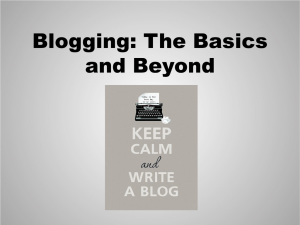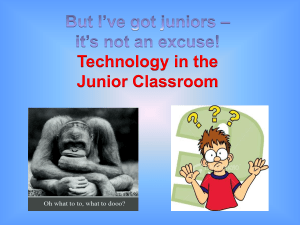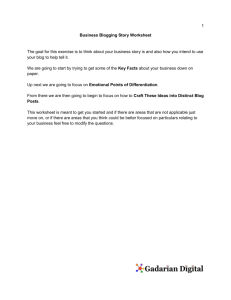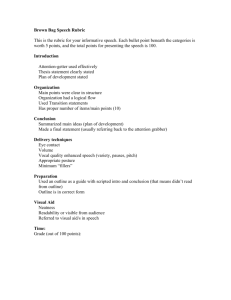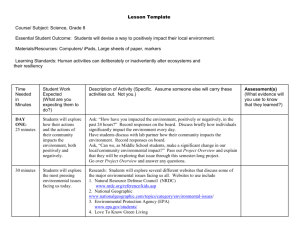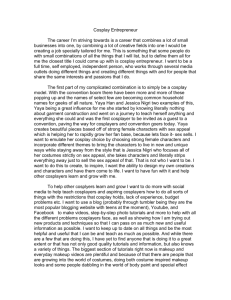Satellite Fall: Developing Informed Opinions Lesson Plan
advertisement
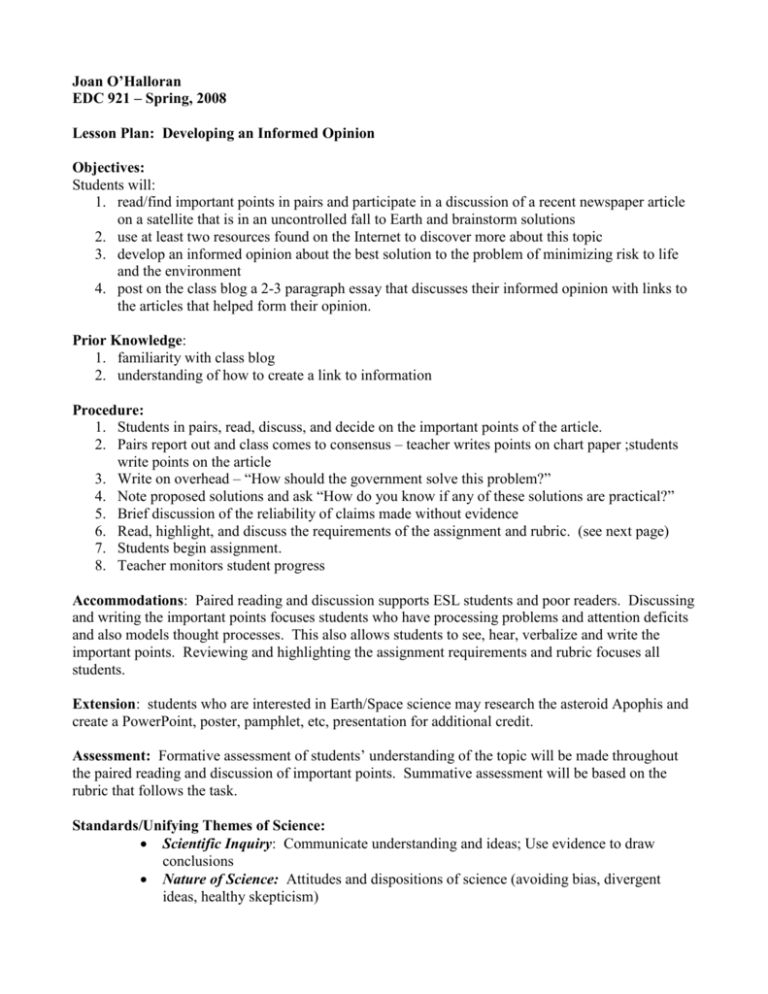
Joan O’Halloran EDC 921 – Spring, 2008 Lesson Plan: Developing an Informed Opinion Objectives: Students will: 1. read/find important points in pairs and participate in a discussion of a recent newspaper article on a satellite that is in an uncontrolled fall to Earth and brainstorm solutions 2. use at least two resources found on the Internet to discover more about this topic 3. develop an informed opinion about the best solution to the problem of minimizing risk to life and the environment 4. post on the class blog a 2-3 paragraph essay that discusses their informed opinion with links to the articles that helped form their opinion. Prior Knowledge: 1. familiarity with class blog 2. understanding of how to create a link to information Procedure: 1. Students in pairs, read, discuss, and decide on the important points of the article. 2. Pairs report out and class comes to consensus – teacher writes points on chart paper ;students write points on the article 3. Write on overhead – “How should the government solve this problem?” 4. Note proposed solutions and ask “How do you know if any of these solutions are practical?” 5. Brief discussion of the reliability of claims made without evidence 6. Read, highlight, and discuss the requirements of the assignment and rubric. (see next page) 7. Students begin assignment. 8. Teacher monitors student progress Accommodations: Paired reading and discussion supports ESL students and poor readers. Discussing and writing the important points focuses students who have processing problems and attention deficits and also models thought processes. This also allows students to see, hear, verbalize and write the important points. Reviewing and highlighting the assignment requirements and rubric focuses all students. Extension: students who are interested in Earth/Space science may research the asteroid Apophis and create a PowerPoint, poster, pamphlet, etc, presentation for additional credit. Assessment: Formative assessment of students’ understanding of the topic will be made throughout the paired reading and discussion of important points. Summative assessment will be based on the rubric that follows the task. Standards/Unifying Themes of Science: Scientific Inquiry: Communicate understanding and ideas; Use evidence to draw conclusions Nature of Science: Attitudes and dispositions of science (avoiding bias, divergent ideas, healthy skepticism) Name: ___________________________________ Period: _____ Date: _______ Task: 1. Using the suggested links, search for and read articles on this topic. 2. Try to find articles with different solutions. For example, one expert might believe that there is no real threat, another may suggest using a warhead to explode the satellite in space, another may suggest some other solution. 3. Based on your research, develop your informed opinion as to the best solution. 4. Post your informed opinion on our class blog. Write several paragraphs that state your opinion, give details supporting your opinion, and link the reader to the articles – you must use at least 2 supporting articles - that support your opinion. 5. Remember, science is based on claims that are supported by evidence! Support your claim. You are writing to persuade – make sure that your argument is logical and detailed. 6. Finally, take a good look at what your work and complete the student portion of the rubric Rubric: Criteria Excellent Response includes well Comprehensive developed opinion, many supporting details, and more (30 points) than 2 linked articles. A thorough understanding of the topic is evident. Response is free of errors in mechanics, usage, grammar, Coherent and spelling (MUGS). (10 points) Evidence of appropriate use of scientific vocabulary. Time Management (10 points) Consistently used time well Focused on task with no reminders Did not distract others Satisfactory Response includes opinion, acceptable supporting details, 2 linked articles. An adequate understanding of topic is evident. Response has few MUGS errors that do not interfere with understanding. Some evidence of appropriate use of scientific vocabulary Used time well Focused on task with 1 or 2 reminders Did not distract others Student Total Teacher Total GRADE: Needs Improvement Opinion is not obvious, details are unclear, or less than 2 linked articles. Understanding of topic is limited. Response contains many MUGS errors, and little evidence of appropriate scientific vocabulary Poor use of time Frequent reminders to stay on task Distraction to others Reflection: My classes actually did read the article on the satellite several weeks ago. The reading lead to a great class discussion and served as a hook for our unit on Astronomy. The discussion was as far as we took it. I read a student’s post, I can’t remember where, that impressed me. This student related his opinion on people choosing to have cosmetic surgery on their hands. He linked his research to his points as he wrote. I thought about the satellite article and the possibility of my students doing something similar. This lesson plan reflects what I hope will become an important use of blogging in my classroom. I spend a great deal of time on the unifying themes of Scientific Inquiry and the Nature of Science. One of my favorite sayings is “The less you know, the more you believe.” My students need as much practice as they can get in the area of scientific thinking. Developing an informed opinion and publishing that opinion gives all students the chance to be heard. This type of assignment improves reading, writing, and critical thinking skills. Classroom discussions frequently revolve around the most talkative and outgoing students. Quiet and reluctant students do not participate fully. Blogging would give students an opportunity express their opinion and then read other opinions and comment. Commenting in writing for all to see makes (or should make) the writer very thoughtful of his/her facts and of the ‘etiquette’ of response. These are useful skills regardless of the discipline. The ability to link research to the opinion eliminates the bibliography and the conversational tone of a blog is more engaging than a formal essay. That being said, I also see problems implementing this lesson plan. This type of assignment could not be our first venture into blogging. My students would need a certain amount of experience navigating the blog and practice with blog etiquette. Success depends on student engagement with the topic and blogging. I wonder how I will organize my teaching time to prepare my students to make use of this wonderful technology.


